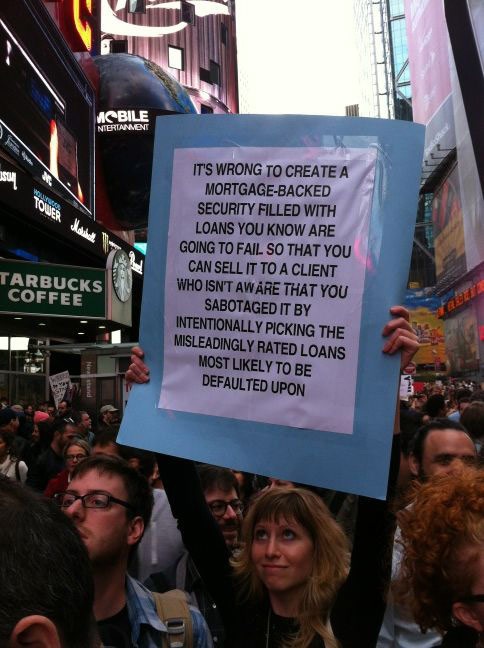Signs Your Sign Will Go Viral
A cute protest sign based on a blog quip has created a minor internet sensation.
This Occupy Wall Street protest sign has gone viral:

it's wrong to create a mortgage-backed security filled with loans you know are going to fail so that you can sell it to a client who isn't aware that you sabotaged it by intentionally picking the misleadingly rated loans most likely to be defaulted upon
Felix Salmon explains how it got that way:
Ben Furnas only has 325 followers on Twitter, but that’s all it took to make this photo of his go seriously viral over the past few days. He posted it on Twitter at 5:42pm on Saturday, with no commentary other than the hashtags #ows and #win. It didn’t take long (I’m a little bit unclear about the timezone of BoingBoing timestamps) before Xeni Jardin posted it on her hugely popular blog. And from there it went, well, everywhere.
By this morning, Conor Friedersdorf, the author of the words in question, was already writing ameta-post about the photo, and how it demonstrates that OWS is “the product of the decentralized networked-era culture”. Xeni, too, had a meta-post of her own. And the makers of the sign were revealed to be Brooklynites Will Spitz and Caitlin Curran. (Sorry, they’re a couple.)
Still, the meme was far from out of juice: when I posted the photo on my Tumblr at 4pm this afternoon, grabbing it from Barry Ritholtz, it very quickly became by far the most liked and shared thing I’ve ever put up on that platform.
A lot of that is because Curran is one of those protestors that photographers dream of. And then there’s the setting — Times Square, with Starbucks in the background and the big Nasdaq sign.
But the heart of the photo is the language on the sign — language much more powerful and striking than the blog post (or even the sentence) from which it was lifted. It’s funny, on the sign — something true, and accurate, and touching, and grammatical, and far too long to be a slogan, and gloriously bereft of punctuation, and ending even more gloriously in a mildly archaic preposition. Friedersdorf has managed to encapsulate the essence and the impropriety of the Abacus deal in just 45 words, and it’s fantastic that Spitz and Curran — and Furnas and Jardin and everybody who shared this image — managed to give those words the global recognition they deserved.
Matt Yglesias says there’s a lesson here: “It’s Not How Many Followers You Have, It’s Who Follows You.”
[H]erein lies one of the secrets of the faux-meritocracy of the internet. Furnas may appear to be a mild-mannered law student with only 325 Twitter followers. But in an earlier life he was a key player in a ton of CAPAF’s policy products and he’s extremely well socially and professionally connected to the younger cohort of political media people. So that 325 includes reporters and editors from The Washington Post, Politico, Slate, Good, ThinkProgress, Mother Jones, and the Nation and think tank folks from CAP, Third Way, New America, and the Manhattan Institute. Given that particular nexus of people, it’s hardly a long and winding path to wide exposure for something interesting.
This, I think, is an illustration of something important. People sometimes talk about the Internet as if it somehow supplants or replaces personal relationships. But in practice, it often acts as a force multiplier for them.
To a point, sure. I’d rather be followed by a dozen influential tweeters than a thousand spambots and inactive accounts. And, yeah, it helps if your personal network is mostly made up of young media luminaries.
On the other hand, the vast preponderance of my Twitter following consists of people I’ve either never met in real life, met in real life because of relationships I’ve built online, or have met maybe once or twice in real life.
Matt is obviously well-connected in the DC and New York City media communities, having spent his entire young career in those circles. But he was famous before he even started interning at TAP because of a little personal blog he started at Harvard. He’s a brand almost entirely through a network of people he’s built from his online work. That there’s also an overlap between his virtual and “real” worlds is a bonus, of course, in relationship building. But he’d still be able to drive memes if he never left his computer.






The first and only sign to come out of OWS, that I wholeheartedly embrace.
In addition to the, “I’ll believe corporations are people when Texas executes one,” sign I mentioned the other day, my other favorite from OWS was, “We’re here, we’re unclear, get used to it.”
There was also a “F-ck Ayn Rand,” sign but that’s probably a bit literary.
@michael reynolds: This is what I’ve been missing. I take back what I said in the other thread about OWS accomplishing nothing – they’ve actually produced some signs with a good mix of humor and truth.
Being an Arkansan, there was was one that I found clever (even though it played into the obnoxious “We are the 99%” mantra) that said, “Alice Walton is 0.16% on soooo many levels”. I probably didn’t have much in common with the views of the sign holder, but I at least recognized the wit.